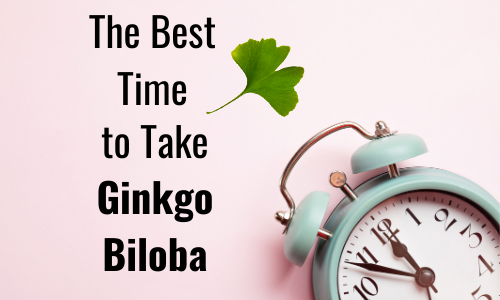We’ve all heard that timing is everything.
But does that apply to herbal remedies?
Sometimes, yes.
When it comes to ginkgo biloba - being that it has varying actions and benefits - ideal timing depends on what you’re using for.
Some benefits are best taken advantage of in the morning, while others are best managed by supplementing at night as you prepare to sleep.
Timing and Tips for Each Use of Ginkgo Biloba
Ginkgo biloba belongs to a class of herbs known as adaptogens - known for optimizing your stress response and promoting overall balance and wellbeing.
Let’s look at a few of its specific benefits and how that plays into the best time to take it.
For Memory
The effect of ginkgo biloba on the brain is still largely speculation as it appears to enhance brain function in healthy individuals.
However, some studies do indicate that ginkgo biloba can improve memory, enhance attention span, and boost focus.
For this purpose, taking ginkgo Biloba in the morning seems like the most plausible option because most tasks requiring cognitive ability are done during the day.
For Anxiety
One study found out that 480 mg of ginkgo biloba could reduce anxiety levels by about 45%.
As for timing, many people who experience anxiety do so while at work. And since most people work during the day, it makes perfect sense to take ginkgo biloba in the morning to prime your system for the day ahead.
For Inflammation
Inflammation is one of the natural responses in the body that helps protect against invasions by foreign substances and pathogens.
However, inflammation should not be long-term or chronic, and that’s exactly what it has become for many individuals.
Certain chronic illnesses trigger inflammatory responses, even when there is no injury. As the illness progresses, the inflammatory process progresses, too, and can eventually cause permanent damage to tissues.
Studies have shown that ginkgo biloba reduces inflammation by reducing the production of inflammatory markers. Some conditions that can possibly benefit from ginkgo include arthritis, heart disease, and inflammatory bowel issues.
If targeting inflammation is your primary reason for using ginkgo biloba, it really doesn’t matter what time of day you take it, though many prefer morning.
For Men’s Wellness
Some sources indicate that ginkgo biloba may be beneficial for men’s concerns such as erectile dysfunction and reduced libido.
One such study showed how ginkgo biloba can improve circulating levels of nitric oxide in the blood. Nitric oxide is a vasodilator. This means that it increases the size of blood vessels and thus improves blood flow.
For men with erectile dysfunction, ginkgo biloba may increase blood flow to those regions. Timing in this instance would be a few hours before ED usually occurs. However, you shouldn’t expect immediate improvement. Being an herb, it needs to be used for several weeks in some cases before reaping the benefits.
For Sleep
By optimizing the body’s response to stress, ginkgo alleviates one of the most common causes of insomnia.
While studies that link ginkgo biloba to improved sleep are limited, one of the promising studies found that it improved sleep quality in people with depression.
They also experienced reduced awakenings after they fell asleep. If better sleep is your goal, try taking ginkgo at night about 30 minutes before bed.
How Long Does It Take for Ginkgo Biloba to Work?
Ginkgo is available in various forms, such as liquid extracts, capsules, tablets, and dried leaves for making tea. Its onset of action will differ depending on the means by which it's taken.
However, in studies where adult participants took about 120 to 240 mg of ginkgo biloba per day in divided doses, it took about 4 to 6 weeks to notice improvements.
So we’re certainly not talking a matter of hours or minutes here. It’s a long-game with ginkgo biloba, and you should expect to supplement with it for weeks before seeing changes.
Is It Okay to Take Ginkgo Biloba Every Day?
Gingko biloba is considered to be generally safe. When taken in reasonable dosages, taking it daily is fine.
However, you should note that the studies on the effectiveness of ginkgo are still not conclusive. And keep in mind that certain herbs can interact with medications, so you should always check with your primary care provider before starting anything new.
The Best Time of Day to Take Ginkgo Biloba
To sum it up, ideal timing depends on why you’re taking ginkgo biloba in the first place. The herb has potent antioxidant and anti-inflammatory properties and potentially improves circulation.
It can help you be more alert and improve memory, suggesting a morning timeframe may be best. But then, it can also improve sleep quality, in which case taking it at night may be more beneficial.

